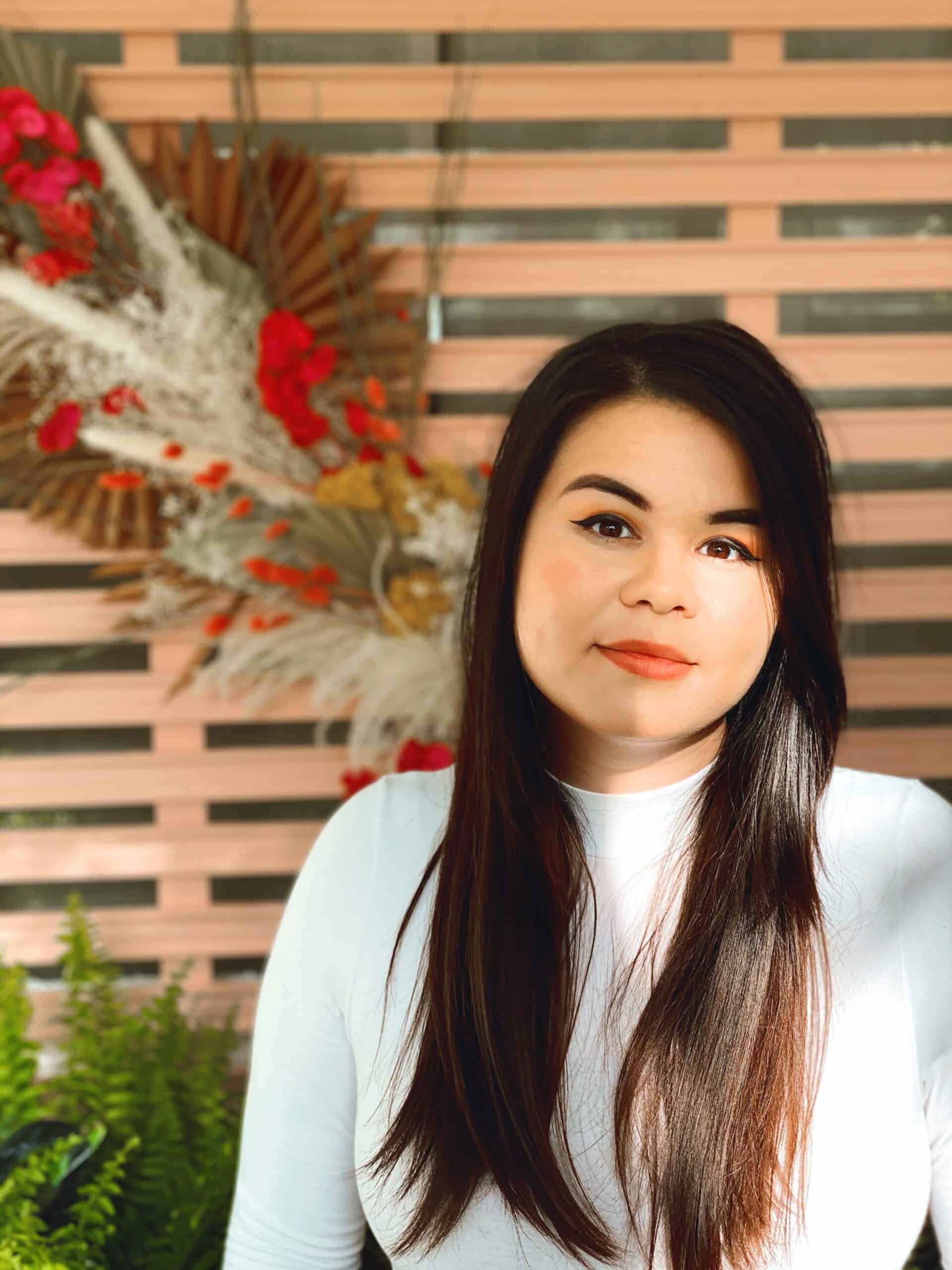Growing up in a home filled with strong, resilient women, Jess discovered early on the power of sisterhood and perseverance. As a middle child raised in Chihuahua, Mexico, she was surrounded by the love and challenges of a female-dominated household. Despite the hardships her family faced, including the struggle to afford basic necessities, Jess emerged with a deep passion for menstrual health advocacy. Her journey led her to found Jess Period, a platform dedicated to addressing period poverty and empowering women through education and open conversation. Jess’s story is a testament to the strength that can be found in adversity and the importance of advocating for change, no matter the obstacles.
Can you share your personal story and the challenges you faced growing up in a home full of women?
I am a virgo and middle child, born and raised in Chihuahua, Mexico. I am a menstrual health advocate, founder of Jess Period and most importantly a menstruator. I grew up with my two sisters, mom and dad and eventually only my mom and sisters remained , soon after we moved in with my grandma, aunt and cousin starting then my journey of being raised amongst only girls. Fast track to when my older sister had kids, she birthed my 3 beautiful nieces. I kid you not when I said my home was full of women and girls. Growing up amongst only girls has been the best experience of my life, words cannot do enough justice to the love I feel for them. I have seen what all of us have endured but also achieved and it’s clear to me that women are capable of doing ANYTHING. While this was a big blessing it was also a big challenge because all the mothers in my family were single mothers and had to leave their kids at home to go to work to get money for food and other essential items. Luxuries were lacking and there were even some christmases where we had a cheap pizza for dinner with no presents to open. As you will read later there were times we didn’t even have the essentials like pads for our periods and where we had money to only buy potatoes to eat. Obviously it would have been better that my mom, grandma, aunt and sister had a partner to support them but life isn’t always that way. Im proud to say that despite the hardship my sisters and I are now able to have a comfortable life and support my mom. I can say sparking period conversations is also a privilege that only became available to me because I had the means to start Jess Period.
What specific events or moments in your life inspired you to start Jess Period?
The triggering moment was a life changing situation I lived involving my reproductive organs at the age of 30 and realizing that I knew very little about my body. During this time I also learned what period poverty was, which was 15 years after I had gotten my first period and that is when I decided something had to be changed. I realized that as a teen I didn’t have enough period supplies because my mom couldn’t afford to get herself and her three daughters enough period supplies, at that time I didn’t know a term for not having period supplies existed and I remember not speaking about it with no one. These two events were what inspired me to start Jess Period as a way of healing, however during all my life I remember multiple events where I fell victim to not knowing about my body enough that I had to live situations I was not prepared for due to lack of information and education.

Can you describe the situation in the state in Mexico where you grew up and how it influenced your mission?
I am from the northern part of Mexico, from the state of Chihuahua, a border state right below Texas and New Mexico. Our main border town is Juarez and by now reading Juarez might have already raised your eyebrows. Many of the good paying jobs in our state are american based companies and usually this is because labor is cheap and reliable. Due to other socio economic and cultural reasons many single mothers have to work graveyard shift in these companies to care for their kids during the day and for these mothers to get to their jobs, these companies hire bus drivers to pickup and drop off the workers because economy is just so bad, they cant afford to have a car. It turns out, these bus drivers are part of the organized crime in these areas. It has been almost 3 decades now where these women have been highly targeted and murdered. This term in Mexico is called femicide.
The combination of highly marginalized communities and organized crime has made these cases go unsolved for years. These cases have now evolved and now all women are targeted, cases wouldn’t and haven’t ceased so we got to a point where it was now a “normal” thing to live with because on top of that, women were being blamed for being kidnapped, raped and murdered. This is a long story to speak about but is the basis of my formation and my extra vigilant state of mind when it comes to walking the streets alone or entering any room alone. Unfortunately to this point, all my close loved ones have suffered from some type of abuse and getting to the age of 30 and just getting to learn what period poverty was at this age, was beyond shocking and disappointing to say the least. You may ask, how does this have anything to do with periods and I have to say, it has everything to do with periods. Since very early on in my life my gender has been targeted because of owning a vulva. Speaking about periods and our bodies for a gender that is deemed “weak” is key to empowerment where I envision young menstruators gaining ownership of their bodies and thus having a ripple effect in other aspects of their lives. If young menstruators have control over themselves the chances of external factors or certain life situations will be easier to handle because they are equipped with the right tools to make meaningful decisions.
What were some of the biggest obstacles you encountered while starting your business?
I think the biggest obstacle is cultural and society stigma along with cultural stereotypes. This is a challenge that still persists because we have been taught for so long that periods are gross that we are not even open to discussing it publicly or seeing it as a natural process like having to eat and reproduce. When we are capable of understanding that we have no opinion on whether we get to menstruate or not is when we will start to really consider factoring in menstruation as part of everyone’s lives including non menstruators.

What has been the most rewarding part of your journey with Jess Period so far?
The most rewarding thing to me is when I either get a direct DM where menstruators share with me their first period experience or when I finally get to meet in person people who follow me and they share their stories with me live. I have heard stories that are either very lovely and caring but also a bit of horrific stories where there was rarely any support. Both type of conversations end up reflecting on how much these types of conversations need to be had and are not being had at a all and this is what keeps me going, knowing that while Jess Period was in many ways a form of me regaining agency of my body and healing personally, it is also a growing need in our communities especially when we are entering a phase of censorship in schools about sex education. If the education we are currently receiving isn’t enough, I cannot imagine where we will be if it becomes censored. There is a society need for this and I haven’t seen enough people speaking about it.
How does Jess Period aim to address period poverty and support women in need?
Firstly by providing educational resources about period poverty and menstruation.It might sound unbelievable for a few, but many menstruators don’t know what period poverty is and that is because we simply don’t have enough comprehensible education about it. Secondly, by sparking the conversation and getting more and more menstruators to speak about periods as a regular health topic. Thirdly, we are educating the advantages of switching to a reusable period collective device. Currently in the rare events menstruation education is being taught the only options mentioned to young menstruators are disposable tampons and pads but never are reusable options mentioned to them. Along with only two options mentioned, there is no mention of the side effects disposable products may have to the health of the menstruator. With Jess Period we are shedding light to all reusable products and showing a way of having a sustainable period.
What advice would you give to young women facing similar struggles to those you experienced?
Speak up! Keeping things to yourself does not help you or anyone. Chances are that if you are going through it someone else did too and you are not alone. Speak to someone about what you are going through, many times getting rid of the mental load is huge help. When we are wrapped up in our own thoughts it’s hard to see outside of it and see a different outcome. Speaking to someone else might help you get a different point of view and might help you see a path to getting into a better place. Also be open and what I mean by that is be open to see things differently, to change your perspective, to unlearn and relearn. If you can’t change a situation that is out of your hands you do have the power of changing yourself towards that situation.
How can communities and individuals get involved in supporting your cause?
The easiest way is by starting a conversation in your own home. Obtaining support in our homes for our menstruation journey is key to having a healthy menstruation journey. Intergenerational conversations are highly encouraged too as we get to see different perspectives of other menstruators lived experiences and get an opportunity to learn new things.
Whether you are at work or at school, avoid having to hide your period. Do not confuse this with flaunting your used period product to everyone’s face, I am just referring to not making an extra effort to hide your period. Your period experiences are valid and should be considered as part of your daily life.
When you are present in a period conversation, call out misinformation and call out a person if they are making fun of it or if you prefer not to call them out then avoid engaging to further fuel the conversation.
Engaging in meaningful conversations in our posts are also a good way to further our message and also we do have a give back program to give donation supplies to menstruators in need. You may donate via our website to help a menstruator.
Can you share a success story or a moment that made you feel proud of your work with Jess Period?
Yes, when I get approached by older women who congratulate me on my work and who share how they would have hoped something like Jess Period existed for them. Many of them are in menopause now but share how they see Jess Period as being a positive experience for new menstruators. And I’d like to share how Jess Period has also sparked a conversation in my own home. Getting to see my nieces and my mom share their thoughts about menstruation and how they live it gives me assurance that while this is a hard thing to do because of the stigma that comes with it, it is also a much needed thing that needs to be done by someone.
What future goals do you have for Jess Period?
One of my ultimate long term goals is to support a donation campaign to fund women’s health studies especially those centered around menstruation & bleeding disorders focused in BIPOC.
How has social media played a role in your business, and how can people follow and support you online?
Social media has become essential now for all businesses, it is where many including myself search for service and product providers but also where people seek to learn new information. Social media allows me to get to those who don’t have someone to speak to candidly about menstruation and also gives me an opportunity to share information and connect with those ready to bring change towards menstruation perception. My instagram and tiktok page are @jessperiod_ and I highly encourage readers to comment on our posts to share their opinions and experiences and invite other menstruators over to keep carrying these conversations.
What message do you want to send to women who are struggling with period poverty and related issues?
If you find yourself struggling to get period products I recommend speaking to someone, there is a very good chance that a friend, someone in your classroom or your job might have period products with them and will be willing to offer support to get you more.
- If you are at school check the bathroom stalls for free products or the infirmary. If you are at work check the first aid kit, the bathroom stalls or ask a coworker. You don’t need to express your situation if you don’t feel like it, a simple “hey I forgot to bring a pad/tampon with me today, do you have one I can use please” is more than enough but I do highly recommend venting with someone about your situation as this will help alleviate your mental load, it is easier to navigate life situations when we have support and they might even be able to help you get period products.
- You can also check one of the local women’s center, they usually stock up on products. Some libraries and planned parenthood provide free suppliers, check them out, if you don’t ask you won’t know.
- You may also call 211 to get support on finding a location near you that can provide free products.And if none of that is available
- You may also reach out to my website where I provide donations of reusable menstrual pad on a first come first serve basis depending on supply availability.
- And if you feel like it, you can start at your school or at your job a request to have free period products. You may reach out to me at my email [email protected] to help you draft a proposal.
IG: @jessperiod_
@jessperiod






